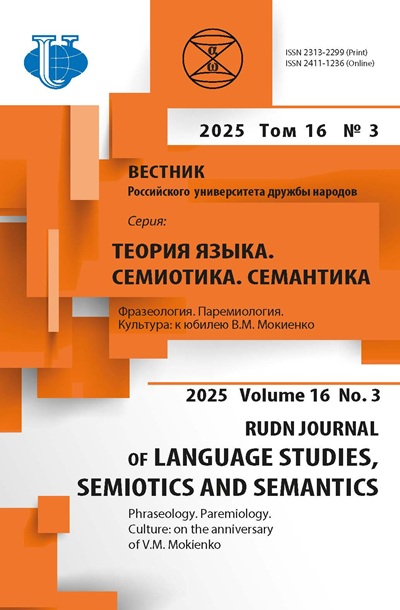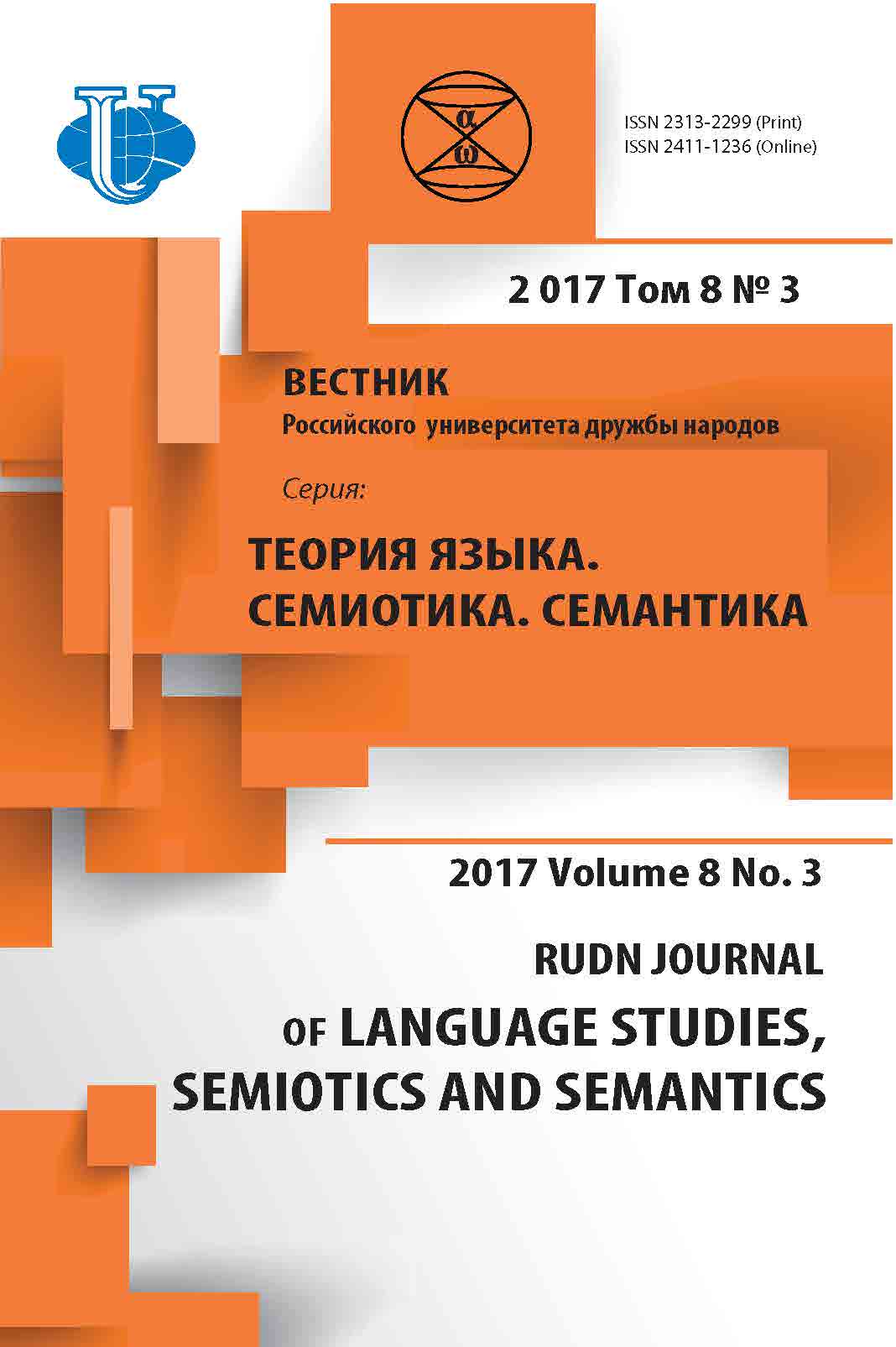МИРОВОСПРИЯТИЕ ПРЕДСТАВИТЕЛЯ АНГЛО-АМЕРИКАНСКОГО АРМЕЙСКОГО СОЦИУМА В ЗЕРКАЛЕ ФРАЗЕОЛОГИЗМОВ ВОЕННОЙ ТЕМАТИКИ
- Авторы: Лупанова ЕВ1
-
Учреждения:
- ФГКВОУ ВПО «Военный университет» Министерства обороны Российской Федерации
- Выпуск: Том 8, № 3 (2017)
- Страницы: 714-723
- Раздел: СТАТЬИ
- URL: https://journals.rudn.ru/semiotics-semantics/article/view/17033
- DOI: https://doi.org/10.22363/2313-2299-2017-8-3-714-723
- ID: 17033
Цитировать
Полный текст
Аннотация
Статья посвящена исследованию особенностей мировосприятия представителя англо-американского армейского социума в зеркале фразеологизмов военной тематики. Актуальность работы обусловлена существующей в современной лингвистике необходимостью всестороннего освещения проблем менталитета членов военной субкультуры как составной части национальной культуры США и Великобритании. Подвергнув анализу содержание лексикографических источников, автор обнаруживает наличие в идиоматике представителей англо-американского военного социума особых образов, отражающих специфику мировоззрения военнослужащих, сформированного под влиянием особенностей функционирования армейского социума и выполняемых военнослужащими задач. Опираясь на фундаментальные работы В.А Масловой «Лингвокультурология» (2001), В.Н. Телии «Русская фразеология. Семантический, прагматический и лингвокультурологический аспекты» (1996), Ю.Н. Караулова «Русский язык и языковая личность» (2010) и др. работы, автор исследует проблематику отражения в фразеологизмах этнического менталитета носителей языка и социальных условий функционирования фразеологизмов военной тематики в англо-американской военной субкультуре. Автор не только подчеркивает общность военной фразеологии с общей фразеологией этноса, но и условия реализации речевого материала в языке профессиональных военнослужащих, образные системы фразеологии которого позволяют рассмотреть особенности языковой картины мира военных, выявить морально-нравственные установки и ценности, изучить проявления этнического менталитета в семантике ФЕ. В статье делается вывод о том, что исследуемые фразеологические единицы имеют преимущественно насмешливый, шутливый характер, репрезентируют юмористическое отношение к различным аспектам жизнедеятельности военнослужащего, что подтверждает факт об освобождающей силе смеха в борьбе со стрессом и психологическим напряжением.
Ключевые слова
Об авторах
Е В Лупанова
ФГКВОУ ВПО «Военный университет» Министерства обороны Российской Федерации
Автор, ответственный за переписку.
Email: katerina.lupanova9751@yandex.ru
Лупанова Екатерина Вячеславовна, адъюнкт кафедры английского языка (основного) Военного университета Министерства обороны РФ; научные интересы: теория языка, лингвокультурология, психолингвистика
ул. Б. Садовая, 14, Москва, Россия, 123001Список литературы
- Бердяев H.A. Судьба России: Сочинения. М.: ЭКСМО Пресс, 2001.
- Военная служба // Военный энциклопедический словарь. Режим доступа: http://encyclopedia.mil.ru/encyclopedia/dictionary/details.htm?id=4343@morfDictionary. Дата обращения: 11.06.17.
- Караулов Ю.Н. Русский язык и языковая личность. М.: Издательство ЛКИ, 2010.
- Крылов К.К. К философии армии // Отечественные записки. 2002. Вып. 8(9). Режим доступа: http://www.strana-oz.ru/2002/8/k-filosofii-armii. Дата обращения: 15.06.17.
- Маслова В.А. Лингвокультурология: Учебное пособие. М.: Издательский центр «Академия», 2001.
- Митрахович В.А. Специфические характеристики военного социума // Образование и наука. 2007. № 5. С. 91-99.
- Нарушевич А.Г. Образ смерти в русской языковой картине мира (на материале пословиц и поговорок) // История языкознания, литературоведения и журналистики как основа современного филологического знания: мат-лы Международ. науч. конф. Вып. 2. История. Культура. Язык. Ростов н/Д.: Изд-во РГУ, 2003. С. 113-115.
- Огаркова Е.В. Грани войны. Смеховая культура в условиях военной повседневности // Известия ВолгГТУ. 2015. Т. 24. № 10 (174). С. 47-51.
- Смех: истоки и функции / под ред. А.Г. Козинцева. СПб.: Наука, 2002.
- Телия В.Н. Русская фразеология. Семантический, прагматический и лингвокультурологический аспекты. М.: Языки русской культуры, 1996.
- Bunting J. The conscience of a soldier // Worldview. 1973. Vol. 16. № 12. Режим доступа: https://worldview.carnegiecouncil.org/archive/worldview/1973/12/2252.html Дата обращения: 11.06.17.
- Jackson J.J., Thoemmes F., Jonkmann K., Ludtke O., Trautwein U. Military Training and Personality Trait Development: Does the Military Make the Man, or Does the Man Make the Military? // Psychological Science. 2012. Режим доступа: http://journals.sagepub.com/doi/ pdf/10.1177/0956797611423545. Дата обращения: 7.06.17.
- QuoDB. Режим доступа: http://www.quodb.com/search/and%2C%20now%2C%20mr.%20 funny%20man%2C. Дата обращения: 10.06.17.
- QuoDB. Режим доступа: http://www.quodb.com/search/two%20extra%20days%20fatigue %20duty. Дата обращения: 10.06.17.
- The Queen’s regulations for the army. Режим доступа: https://www.gov.uk/government/ uploads/system/uploads/attachment_data/file/440632/20150529-QR_Army_Amdt_31_Jul_2013.pdf. Дата обращения: 15.06.17.
Дополнительные файлы












